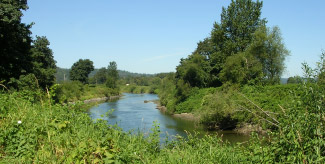Creek restoration at Ames Creek Farm: Where there’s a fish, there’s a way
by Alicia Lundquist Guy, Director, PCC Farmland Trust
This article was originally published in April 2007
Join us for a creekside planting party
Sunday, April 15 from 10 a.m. to 2 p.m.
Ames Creek Farm
27307 N.E. 100th Street
Carnation 98014
If you would like to participate in the restoration project on Sunday, April 15, please call Alicia Guy or Kathryn Gardow at 206-547-1222.

(April 2007) — When the PCC Farmland Trust purchased Ames Creek Farm in the spring of 2006, weeds were the dominant crop. Great care was taken by the farmers now on the land to till the fallow soil and grow a rich variety of organic vegetables.
Now, as we enter the second growing season as the stewards of Ames Creek Farm, we can assist the farmers in re-creating habitat for wildlife at the farm.
Open ditches criss-cross the farm and then feed into Ames Creek. In a non-organic farm, these ditches would be the depositories of pesticide runoff that would make its way into Ames Creek and, after a short ride downstream, into the Snoqualmie River. But here, on this certified organic farmland, we have the opportunity to make the creek a life-sustaining entity instead.
On April 15, the PCC Farmland Trust and Stewardship Partners, a local conservation organization, will be working together to restore native creekside habitat to the tributaries of Ames Creek. Planting a variety of deciduous and conifer trees will prevent soil erosion and sediment buildup and provide shade for cutthroat trout, steelhead, sockeye and coho salmon. With cooler water in the heat of summer, these native fish species are more able to spawn successfully in the fall.
Planting native trees along stream banks to restore riparian areas also is of great benefit to less water-bound wildlife, such as birds, amphibians and small mammals. Ninety percent of bird species use riparian areas for feeding, cover or nesting. This will be a good bird-watching starting point at the farm to keep track of how the populations may shift over time with new habitat.
The restoration project at Ames Creek is part of the farm’s Salmon-Safe certification, a regional eco-label managed in Washington by Stewardship Partners. Farmers who meet criteria for sustainable farming and habitat management practices are awarded with the Salmon-Safe designation.
All of the farms that lease PCC Farmland Trust farmland are Salmon-Safe certified. Many of their products sport the Salmon-Safe label. Find out more about the program at stewardshippartners.org.
If you would like to participate in the restoration project on Sunday, April 15, please call Alicia Guy or Kathryn Gardow at 206-547-1222.
